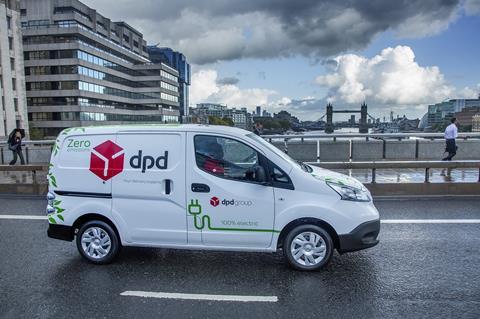
DPD has teamed up with electric vehicle tyre maker ENSO to trial new tyres that are designed to reduce air and microplastic pollution.
Tyres are largely made of fossil fuels and as they wear down emit more air pollution than tailpipes, with tyre particulate matter pollution also making up 28% of all primary ocean microplastics.
DPD said tyre pollution is an even bigger problem for EVs, because their increased weight and torque wears tyres faster.
ENSO has now come up with a new tyre that increases EV range and reduces the pollution they emit.
The nine-month trial involves comparison of the new tyres with industry benchmarks on a fleet of DPD’s Nissan e-NV200 vans at the parcel firm’s Westminster and Hyde Park depots.
Read more
- DPD to double electric fleet with new Maxus deal
- DPD vehicles take part in new project to monitor urban air quality
- MT Awards 2020: Pioneering on electric vehicles takes DPD to Clean Fleet Van Operator of the Year award
Olly Craughan, DPD head of CSR, said: “Rather than just simply buying EVs, our whole approach to sustainability is about joining the dots and working with like-minded innovators to help solve the big challenges like air pollution.
“While EVs are the future, unless we also solve the problem of tyre PM pollution, we aren’t really unlocking their full potential.”
Added Chris Moss, senior manager at BearingPoint, the management consultancy that undertook research for the recent British Retail Consortium Net Zero Report: “Leading EV operators such as DPD are now taking their innovations to the next level, and this trial of new EV tyres highlights how the industry is starting to tackle wider pollutants.
"As we advised the BRC in their Net Zero Report for retailers, there are many other options to reduce emissions other than looking at engine and propulsion systems. Whilst there is a significant focus on carbon emissions we must look at all pollution from operations and seek to find better solutions. It’s great to see DPD take the lead on this with ENSO.
"Both financially and environmentally, there is no substitute for operating all assets as efficiently as possible and DPD's commitment to new tyre technology demonstrates this. Our net zero journey won’t stop with electric vehicles replacing diesel. It is just the next milestone on the journey to logistics businesses and their customers operating more sustainably.”














